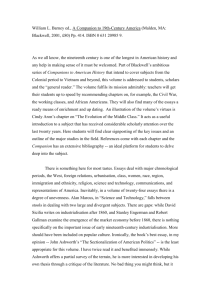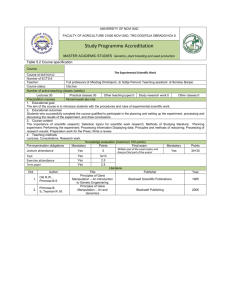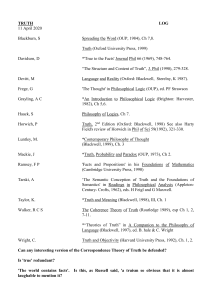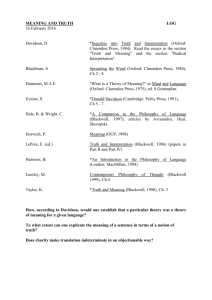LS 401-001_S.Brophy_Winter 2016
advertisement
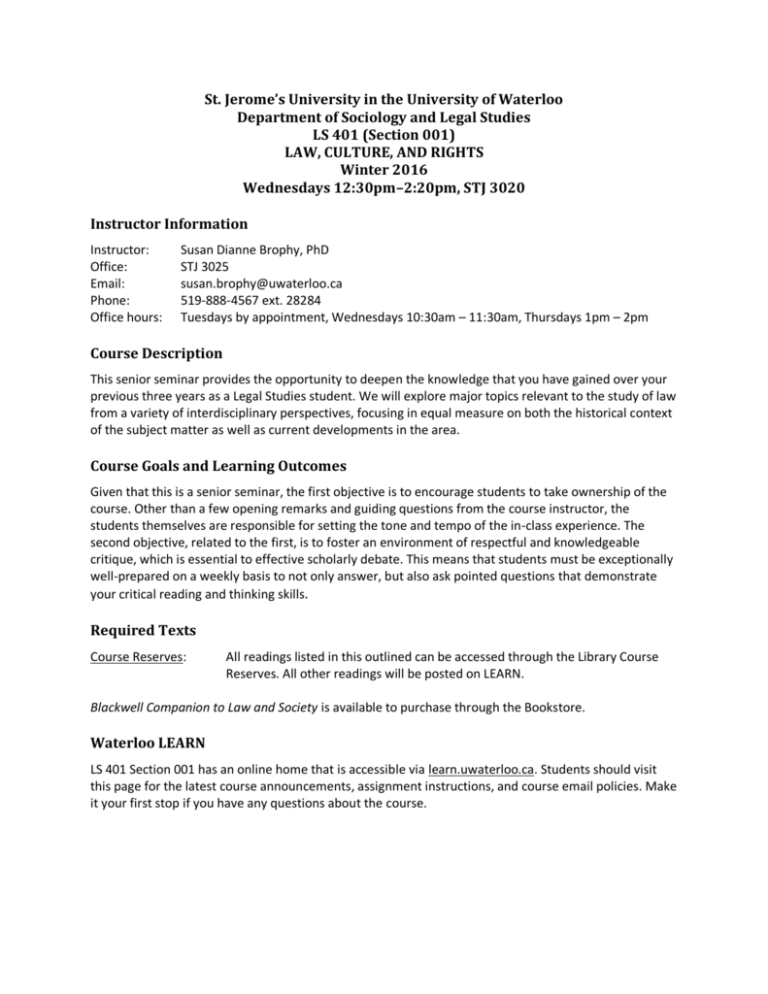
St. Jerome’s University in the University of Waterloo Department of Sociology and Legal Studies LS 401 (Section 001) LAW, CULTURE, AND RIGHTS Winter 2016 Wednesdays 12:30pm–2:20pm, STJ 3020 Instructor Information Instructor: Office: Email: Phone: Office hours: Susan Dianne Brophy, PhD STJ 3025 susan.brophy@uwaterloo.ca 519-888-4567 ext. 28284 Tuesdays by appointment, Wednesdays 10:30am – 11:30am, Thursdays 1pm – 2pm Course Description This senior seminar provides the opportunity to deepen the knowledge that you have gained over your previous three years as a Legal Studies student. We will explore major topics relevant to the study of law from a variety of interdisciplinary perspectives, focusing in equal measure on both the historical context of the subject matter as well as current developments in the area. Course Goals and Learning Outcomes Given that this is a senior seminar, the first objective is to encourage students to take ownership of the course. Other than a few opening remarks and guiding questions from the course instructor, the students themselves are responsible for setting the tone and tempo of the in-class experience. The second objective, related to the first, is to foster an environment of respectful and knowledgeable critique, which is essential to effective scholarly debate. This means that students must be exceptionally well-prepared on a weekly basis to not only answer, but also ask pointed questions that demonstrate your critical reading and thinking skills. Required Texts Course Reserves: All readings listed in this outlined can be accessed through the Library Course Reserves. All other readings will be posted on LEARN. Blackwell Companion to Law and Society is available to purchase through the Bookstore. Waterloo LEARN LS 401 Section 001 has an online home that is accessible via learn.uwaterloo.ca. Students should visit this page for the latest course announcements, assignment instructions, and course email policies. Make it your first stop if you have any questions about the course. 2 Course Evaluation Requirement Seminar Leader(s) Participation Essay 1 Ideology & Rights Essay 2 Selected Topic Description All Seminar Leaders must, by noon on the Monday before class: - post questions on LEARN - post 1 additional scholarly reading (7 pages min, 30 pages max) - post 1 additional news item related to topic (1 year old max) Includes regular participation and contributions during Week 8’s Essay Writing Workshop. Topic and instructions on LEARN. - Critical reading and paraphrasing. - 9 pages min, 11 pages max. Topics and instructions on LEARN. - Analysis and argument. - 9 pages min, 11 pages max. Value Schedule 15% Schedule to be decided on first day of class. 25% Weekly 30% 30% MON FEB 8 - hard copies only - submit to essay drop box by 2pm (located outside SJU library) MON MAR 28 - hard copies only - submit to essay drop box by 2pm (located outside SJU library) Submission and Pick-up of Assignments Submit hard copies of all essays via the SJU dropbox by 2pm. The dropbox (look for the professor’s name) is located on the 2nd floor of Academic Building, outside the SJU Library. Graded assignments shall be returned within two weeks of the date of submission. Missed Classes All students are entitled to one “penalty-free” missed class for which no documentation is necessary. If a student misses more than one class, official documentation must be provided to the professor as soon as possible. If no official documentation is received, the student can expect deductions in-line with the late penalty outlined below: 5% per missed class deducted from the overall participation grade. Late and Missed Course Requirements Any assignment submitted after the date and time that it is due will be subjected to a 5% per day late penalty (Saturdays and Sundays together count for 5%). For example, if you submit a paper that is assessed at 85%, it will fall to 80% if you submit it late by one day, 75% for two days, and 70% for three (and so on). Note: (a) your assignment will not be accepted if it is more than 5 days late; (b) the following policies also apply if you think that you will not be able to carry-out your responsibilities as a seminar leader on the date you selected at the beginning of the term. Accommodations will only be considered if: (a) you are ill and submit a University of Waterloo Verification of Illness Form to the course 3 instructor as soon as possible; (b) there was a death of a family member, which you can prove through official documentation (travel receipts will not suffice) submitted to the course instructor; (c) due dates conflict with important dates on your religious calendar, and you have informed the course instructor of this fact; (d) you are registered with AccessAbility Services and can provide the course instructor with the relevant documentation. Do familiarize yourself with the University of Waterloo’s policies on what your responsibilities are in the event of a late or missed course requirement: https://uwaterloo.ca/registrar/finalexaminations/examination-regulations-and-related-matters#acc_illness Keep in mind the following regulations: Students in on-campus courses who are ill and unable to meet assignment due dates or write a term test or final examination should seek medical treatment and provide confirmation of the illness to the instructor(s) within 48 hours by submitting a completed University of Waterloo Verification of Illness Form to support requests for accommodation due to illness. The University of Waterloo Verification of Illness Form is normally the only acceptable medical documentation and is available on line at uwaterloo.ca/health-services/student-medicalclinic/services/verification-illness. Students who consult their physician or use the services of an off-campus walk-in clinic must provide this form to the attending physician for completion; doctors' notes and forms created by the physician or clinic are normally not acceptable. Class Schedule = MANDATORY READING – everybody should do all readings, but if you run out of time, at the very least do the readings that bear this symbol. Those readings or sources that do not have this symbol beside them are ones that the Seminar Leaders should nevertheless be familiar with in order to lead their assigned session in a knowledgeable and effective manner. Seminar Leaders should locate one additional scholarly reading (min 7 pages, max 30 pages) and one additional news item, and post these works to the relevant LEARN discussion group by noon on the Monday before class. This content must illuminate some aspect of their assigned subject area and help focus the discussion for that session. The additional reading can be from a scholarly journal or book, while the additional news item can be from a newspaper, blog, or magazine; focus on finding timely sources that speak to a current event. January 6 WEEK 1 OVERVIEW & INTRODUCTION UNIT I: CULTURE January 13 WEEK 2 Theme: IDEOLOGY Objectives: 4 - Blackwell Reader LEADERS’ ADDITION(S) Journal(s) or Chapter(s) establish a working understanding of ideology in general decipher the connection between ideology and law explore recent events that help illuminate the relation between law and ideology Ewick, Patricia (2004) ‘Consciousness and Ideology’ in Blackwell Companion to Law and Society, pp. 80-92. Also read the additional materials provided by this week’s Seminar Leader(s). Content will be available on LEARN by Monday at noon. Pirie, Fernanda (2010) ‘Law before Government: Ideology and Aspiration’ in Oxford Journal of Legal Studies 30(2): 207-228. Silbey, Susan S. (1998) ‘Ideology, Power, and Justice’ in Justice and Power in Sociolegal Studies, B. G. Garth & A. Sarat (eds.), pp. 272-299. Other Hunt, Alan (1985) ‘The Ideology of Law: Advances and Problems in Recent Applications of the Concept of Ideology to the Analysis of Law’ in Law & Society Review 19(1): 11-38. Schachter, Harvey, ‘Has “wellness” become a dangerous ideology?’ (Sep 4 2015) in The Globe and Mail. Orwin, Clifford, ‘Trump: an opportunist for sure, but not a fascist’ (Dec 2 2015) in The Globe and Mail. January 20 WEEK 3 Theme: CULTURE WARS Blackwell Reader Valdes, Francisco (2004) ‘Culture, “Kulturkampf,” and Beyond: The Antidiscrimination Principle under the Jurisprudence of Backlash’ in Blackwell Companion to Law and Society, pp. 271-287. Also read the additional materials provided by this week’s Seminar Leader(s). Content will be available on LEARN by Monday at noon Wilson, Joshua (2013) ‘Abortion Politics, Legal Power, and Storytelling’ in The Street Politics of Abortion: Speech, Violence, and America’s Culture Wars, pp. 1-24. Burwell v. Hobby Lobby Stores, Inc., 573 US 22 - Supreme Court 2014 LEADERS’ ADDITION(S) Journal(s) or Chapter(s) Other Objectives: - develop a working understanding of culture in general - build from last class, linking ideology to culture - link culture to law - explore historical and contemporary versions of the “culture wars” - link “culture wars” to law Akin, David, ‘Canadian culture gets “progressive” under Liberals’ (Dec 14 2015), Toronto Sun. Williams, Patricia J., ‘What do we laugh at when we laugh at Trump?’ (Dec 23, 2015), The Nation. 5 January 27 WEEK 4 Theme: POP LAW Blackwell Reader Sherwin, Richard K. (2004) ‘Law in Popular Culture’ in Blackwell Companion to Law and Society, pp. 95-109. Also read the additional material provided by this week’s Seminar Leader(s). Content will be available on LEARN by Monday at noon. Ouellette, Laurie (2011) ‘Real Justice: Law and Order on Reality Television’ in Imagining Legality: Where Law Meets Popular Culture, A. Sarat (ed.), pp. 152-176. LEADERS’ ADDITION(S) Journal(s) or Chapter(s) Other Objectives: - build from last class, linking ideology, culture and popular culture - explore “expressions” of law - assess how law is represented and/or misrepresented, and why Schachner Chanen, Jill (2004) ‘STAY TUNED: With Reality TV Shows, Videotape Evidence and High-Tech Court Presentations, the Medium Has Become the Message in Law’ ABA Journal 90(10): 44-48. Garcia, Michelle, ‘Killer Mike is defending rap as an art form to the Supreme Court. Here’s why’ (Dec 22 2015), Vox. Lawson, Mark, ‘Serial thrillers: why true crime is popular culture's most wanted’ (Dec 12 2015), The Guardian. UNIT II: RIGHTS February 3 WEEK 5 Theme: INTERNATIONAL LAW Blackwell Reader Hajjar, Lisa (2004) ‘Human Rights’, in Blackwell Companion to Law and Society, pp. 589-602. Also read the additional material provided by this week’s Seminar Leader(s). Content will be available on LEARN by Monday at noon. Krever, Tor (2013) ‘International Criminal Law: An Ideology Critique’ Leiden Journal of International Law 26(3): 701-723. LEADERS’ ADDITION(S) Journal(s) or Chapter(s) Other Objectives: - develop a working understanding of rights in general - develop a working understanding of international law - explore the status of rights at the international level - examine how rights discourse can be deployed in various situations - assess the “health” of human rights today Petrasek, David (2012) ‘A Road Less Travelled: International Human Rights Advocacy and Armed Groups’ Journal of Human Rights Practice 4(1): 128-140. ‘Putin signs law allowing Russia to overturn rulings of international rights courts’ (Dec 15 2015), Reuters. Various contributors, ‘When humanitarian law meets human rights’ (Dec 15 2015), OUPblog. 6 February 10 WEEK 6 Theme: CORPORATIONS Blackwell Reader Nielsen, Laura Beth, ‘The Work of Rights and the Work Rights Do’ Blackwell Companion to Law and Society, pp. 63-79. Also read the additional material provided by this week’s Seminar Leader(s). Content will be available on LEARN by Monday at noon. Ruggie, John Gerard (2013) ‘Introduction: Why Business and Human Rights?’ in Just Business: Multinational Corporations and Human Rights, pp. xv-l. LEADERS’ ADDITION(S) Journal(s) or Chapter(s) Case(s) Objectives: - assess how rights discourse has evolved - explore corporations’ rights - examine how corporations influence direction of human rights - understand problems with enforcement in instances of violation McCorquodale, Robert & Simons, Penelope (2007) ‘Responsibility Beyond Borders: State Responsibility for Extraterritorial Violations by Corporation of International Human Rights Law’ in Modern Law Review 70(4), pp. 598-625. Jungk, Margaret, ‘Why do we know so little about corporate human rights abuses?’ (Dec 2 2015), Huffington Post. Ramatlapeng, Mphu, ‘What should human rights mean for an international business?’ (Dec 10 2015), The Guardian. Anderson, Mark, ‘Canadian mining company accused of exploiting Eritrea's forced labour’ (Aug 19 2015) in The Guardian. February 24 WEEK 7 Theme: SOCIAL MOVEMENTS & ACTIVISM Blackwell Reader McCann, Michael ‘Law and Social Movements’, in Blackwell Companion to Law and Society, pp. 506-519. Also read the additional material provided by this week’s Seminar Leader(s). Content will be available on LEARN by Monday at noon. Finnegan, Amy C., Saltsman, Adam P., White, Shelley K. (2010) ‘Negotiating Politics and Culture: The Utility of Human Rights for Activist Organizing in the United States’ Journal of Human Rights Practice 2(3): 307-333. LEADERS’ ADDITION(S) Journal(s) or Chapter(s) Other Objectives: - develop an understanding of what a “social movement” is/is not - assess the role of rights in social movements throughout history - ascertain the health and viability of social movements today - discuss whether human rights are effective tools in social movements Harrelson-Stephens, Julie & Callaway, Rhonda (2014) ‘You Say You Want a Revolution: the Arab Spring, Norm Diffusion, and the Human Rights Regime’ Human Rights Review 15(4): 413-431. Goodman, Amy & Gonzalez, Juan, ‘Free Speech Not Allowed? Mall of America Can't Stop Black Lives Matter Rally over Jamar Clark Death’ (Dec 23 2015), Democracy 7 Now. (Video and transcript.) Bronskill, Jim, ‘Terrorists could infiltrate Canadian oil protests, report claims’ (Dec 6 2015), Toronto Star. Forcese, Craig & Roach, Kent, ‘Bill C-51: the good, the Bad…and the Truly Ugly’ (Feb 13, 2015) in The Walrus. March 2 WEEK 8 ESSAY WRITING WORKSHOP Bring your Essay 1 and an outline of Essay 2 to share and discuss. UNIT III: DOMAINS OF LAW March 9 WEEK 9 Theme: FAMILY Blackwell Reader Boyd, Susan B. (2004) ‘Legal Regulation of Families in Changing Societies’ in Blackwell Companion to Law and Society, pp. 255-267. Also read the additional material provided by this week’s Seminar Leader(s). Content will be available on LEARN by Monday at noon. Triger, Zvi (2012) ‘Introducing the Political Family: A New Road Map for Critical Family Law’ Theoretical Inquiries in Law 13(1): 361-384. LEADERS’ ADDITION(S) Journal(s) or Chapter(s) Other Objectives: - develop an understanding of the family in a legal and cultural sense - assess how ideas of family have changed - explore law’s role in how we understand family - examine how is the family regulated today Bridgeman, Jo; Keating, Heather M. (2008) ‘Introduction: Conceptualising Family Responsibility’ in Responsibility, Law and the Family, J. Bridgeman, H.M. Keating & C. Lind (eds.), pp. 1-16. Bailey, Kate, ‘At last, a domestic violence law that shines a light on coercive control’ (Dec 28 2015), The Guardian. CBC News, ‘Cy and Ruby's Law demands more parental rights for LGBTQ couples’ (Dec 10 2015), CBC News. March 16 WEEK 10 Volokh, Eugene, ‘The “Sister Wives” case, criminal punishment of polygamy and the free speech clause’ (Aug 28 2015) in The Washington Post. Theme: IMMIGRATION Objectives: - develop a working understanding of citizenship - build a critical notion of membership - examine themes having to do with inclusion/exclusion - explore the historical patterns in immigration law 8 - assess how the legal subjectivity of “immigrant” is constructed LEADERS’ ADDITION(S) Journal(s) or Chapter(s) Sterett, Susan (2004) ‘Immigration’, in Blackwell Companion to Law and Society, pp. 354-368. Also read the additional material provided by this week’s Seminar Leader(s). Content will be available on LEARN at least 48hrs before the start of class. Makowsky, Michael & Stratmann, Thomas (2014) ‘Politics, unemployment, and the enforcement of immigration law’ in Public Choice 160(1-2), pp. 131-153. Other Cook-Martín, David & Fitz Gerald, David (2010) ‘Liberalism and the Limits of Inclusion: Race and Immigration Law in the Americas, 1850–2000’ The Journal of Interdisciplinary History 41(1): 7-25 Canadian Citizenship test – Study Questions Blackwell Reader Osborne, Louise & Russell, Ruby, ‘Stateless in Europe: “We are no people with no nation”’ (Dec 27 2015), The Guardian. March 23 WEEK 11 Theme: RELIGION Blackwell Reader Barzilai, Gad (2004) ‘Legal Categorizations and Religion: On Politics of Modernity, Practices, Faith, and Power’ in Blackwell Companion to Law and Society, pp. 392-406. Also read the additional material provided by this week’s Seminar Leader(s). Content will be available on LEARN by Monday at noon. Trigg, Roger (2007) ‘Law and Religion’ in Religion in Public Life: Must Faith Be Privatized?, pp. 150-170. Jukier, Rosalie & Woehrling, José (2014) ‘Religion and the Secular State in Canada’ for the International Center for Law and Religion Studies. LEADERS’ ADDITION(S) Journal(s) or Chapter(s) Other Objectives: - explore the historical connection between law and religion - examine how religion is regulated today - link religion to discussions about immigration, culture, and ideology - assess how religion influences international law - what the separation between church and state means for law Bussey, Barry W., ‘Trinity Western University — and religious freedom — wins again’ (Dec 15 2015), National Post. Trinity Western University v. The Law Society of British Columbia, 2015 BCSC 2326 Mouvement laïque québécois v. Saguenay (City) 2015 SCC 16 March 30 WEEK 12 Theme: INTELLECTUAL PROPERTY Objectives: - develop an understanding of intellectual property as a field of law - examine the major controversies associated with this field - link to discussions about culture and rights 9 Blackwell Reader LEADERS’ ADDITION(S) Journal(s) or Chapter(s) Other explore the nature of the struggle for “the commons” versus copyright Coombe, Rosemary J. (2004) ‘Commodity Culture, Private Censorship, Branded Environments, and Global Trade Politics: Intellectual Property as a Topic of Law and Society Research’ in Blackwell Companion to Law and Society, pp. 369-387. Also read the additional material provided by this week’s Seminar Leader(s). Content will be available on LEARN by Monday at noon. Bowrey, Kathy (2001) ‘The Outer Limits of Copyright Law – Where Law Meets Philosophy and Culture’ Law and Critique 12(1): 75-98. Association for Molecular Pathology v. Myriad Genetics (No. 12-398) Supreme Court of the United States (June 2013) Canadian Intellectual Property Office, ‘Understand the basics’ Lewis, Leo, ‘Bright idea pioneer shining a light on innovation in Japan’ (Dec 28 2015), Financial Times. Editorial Board, ‘Deregulate the music industry’ (Dec 16 2015), BloombergView. 10 IMPORTANT INFORMATION Academic Integrity To maintain a culture of academic integrity, members of the University of Waterloo and its Federated University and Affiliated Colleges are expected to promote honesty, trust, fairness, respect, and responsibility. Discipline A student is expected to know what constitutes academic integrity, to avoid committing academic offences, and to take responsibility for his/her actions. A student who is unsure whether an action constitutes an offence, or who needs help in learning how to avoid offences (e.g., plagiarism, cheating) or about “rules” for group work/collaboration should seek guidance from the course professor, academic advisor, or the Associate Dean. When misconduct has been found to have occurred, disciplinary penalties will be imposed under the St. Jerome’s University Policy on Student Discipline. For information on categories of offenses and types of penalties, students should refer to University of Waterloo Policy 71 (Student Discipline). Grievance A student who believes that a decision affecting some aspect of his/her university life has been unfair or unreasonable may have grounds for initiating a grievance. Students who decide to file a grievance should refer to University of Waterloo Policy 70 (Student Petitions and Grievances). For more information, students should contact the Associate Dean of St. Jerome’s University. Appeals A student may appeal the finding and/or penalty in a decision made under the St. Jerome’s University Policy on Student Discipline or University of Waterloo Policy 70 (Student Petitions and Grievances) if a ground for an appeal can be established. In such a case, read St. Jerome's University Policy on Student Appeals. Academic Integrity Office (UW) http://uwaterloo.ca/academic-integrity/ Note for students with disabilities The AccessAbility Services (AS) Office, located in Needles Hall, Room 1132, collaborates with all academic departments to arrange appropriate accommodations for students with disabilities without compromising the academic integrity of the curriculum. If you require academic accommodations to lessen the impact of your disability, please register with the AS Office at the beginning of each academic term.
